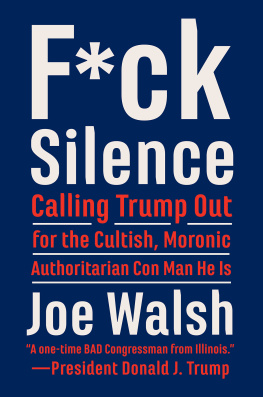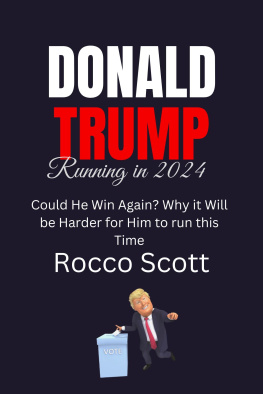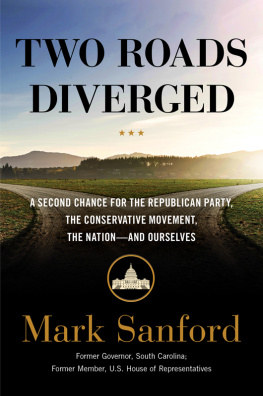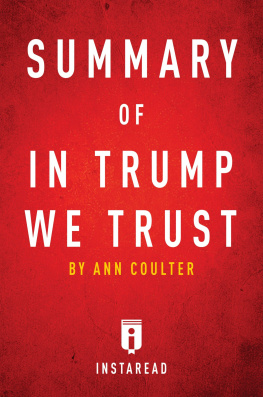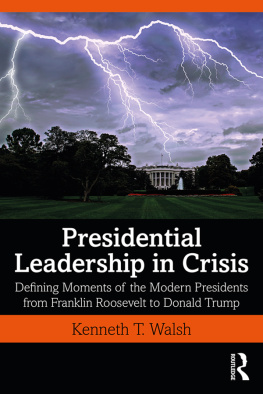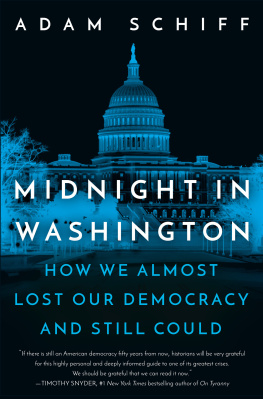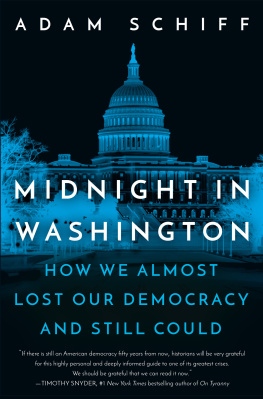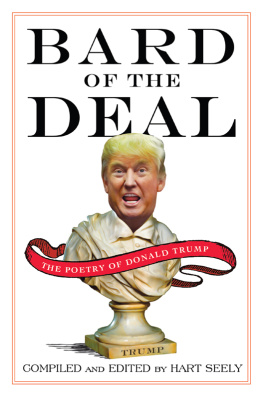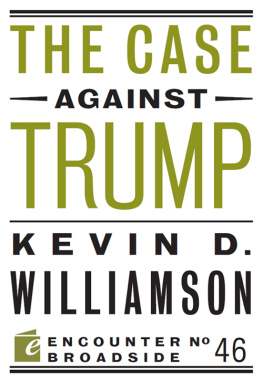Table of Contents
Landmarks
This book is about speaking up. About the imperative of speaking up. About having the courage to speak up. About speaking up even when you know that it will hurt you financially, professionally, and politically to do so. Its about placing country first.
To this end, this book would not have been written without the courage of those who came before me who refused to remain silent and who spoke up against partyagainst their political interests. They should be acknowledged. I think of Margaret Chase Smith, the newly elected Republican senator from Maine who, in 1950, stood and denounced a demagogic senator from her own party named McCarthy. I think of that group of Republican members of Congress, including Barry Goldwater, who in 1974 had the courage to pay a visit to the White House, a visit that made clear to a president from their own party that he had better resign or face impeachment.
I think of the courage of all those Never Trumpers, who, from the very beginningfrom the moment he rode down that escalator in the summer of 2015spoke publicly against then-candidate Donald Trump. I think of elected officials like Senator Jeff Flake, and political commentators like Bill Kristol, who understood from the beginning the threat this person was to our Republic. Contrary to what the Trump grifters will tell you, it does not benefit a Republicans or a conservatives career to publicly oppose Trump. All those who sacrificed their livelihoods by refusing to remain silent against Trump deserve a huge thanks.
Finally, I think of all those of thoseincluding myselfwho have had the courage over the course of these past three years to publicly admit our mistake in supporting Trump and pledge to oppose him, on the record and out loud. Better late than never to have the courage to speak up.
L ets take a trip down memory lane, through the last thirty-plus years of our countrys presidential elections. In 1988, the matchup was George H. W. Bush versus Michael Dukakis; in 1992, it was Bush versus Bill Clinton; in 1996, it was Bob Dole versus Clinton; in 2000, it was Bush versus Al Gore; in 2004, it was Bush versus John Kerry; in 2008, it was John McCain versus Barack Obama; in 2012, it was Mitt Romney versus Obama; in 2016, it was Donald Trump versus Hillary Clinton. Up to 2016, there werent any outliers in that list; you could go back for a while further and still not come across any. Sure, the Bushes and the Clintons were political dynasties, but the politics of each one of them were pretty normal between the center-right and the center-left. Dole, McCain, and Romney were mainstream Republicans, just as Dukakis, Gore, and Kerry were mainstream Democrats, even if it was up for debate just how conservative or just how liberal each one was. Obama provoked a political rebuke stronger than any of his recent predecessors had, of which I was a part. There might not be a major US political figure in my lifetime with whom Ive disagreed more strongly than him. But he had a coherent, sane worldview, and I consider him a patriotic American.
Trump is the one person from this list who stands way, way apart from the rest. But its not because he was a businessman who had never held elected officethe kind of outsider that antiestablishment voters have long pined for to shake up the system. Its because at no point in Trumps life did he ever develop a basic understanding and appreciation for our form of governmentfor democracy. He has never been one to play by the rules. And when he took that instinct into a job requiring that he uphold the Constitution and the laws of the United States, which he neither understands nor cares about, our country almost seemed destined to take a tumultuous ride for the following few years. I didnt foresee the scope of that possibility in 2016but I sure as hell see it in the rearview mirror now.
His rise means one thing: for the first time in memory, Americans are not choosing between just a Republican and a Democrat. Both parties can scream about the threat the other poses to the country, but their warnings apply to government policy. Republicans worry about Democrats nationalizing medical insurance, just as Democrats worry about Republicans repealing Obamacare. They can each say that their opponents ideas are mortal threats to the United Statesand as someone who comes from the world of talk radio, I grant that this kind of overstatement often doesnt do the publics mood any favors. But ultimately, this kind of disagreement is over legislation that Congress should pass. I side with the Republican point of view on most such issues. But those are not the issues that define Donald Trump.
Trump is defined not by his stance on health care reform but by his flagrant abuse of his offices powers. He is defined not by his trade strategy but by his narcissism, which liberates him to behave however he damn well pleases. He is defined not by the Tax Cuts and Jobs Act but by his cult of personality, which resembles that of historical and contemporary authoritarians and even dictators. He is not part of the kind of binary choice that Americans are used to making between the two major parties. He is part of something much, much broader and history bending: a choice between a president and a wannabe tyrant, between democracy and despotism.
LookI straight-up disagree with the Democratic Party about a lot of things. Im troubled that its left flank, which makes economic promises that the government could never keep, is gaining so much influence in its ranks. Im downright disturbed that two-thirds of American adults cant accurately define socialism, per a YouGov survey from October 2019, and that 70 percent of millennials say they would vote for self-described socialists. This tells me that too much of the country doesnt adequately appreciate the damage that socialism has done to people worldwide and so is okay with some idea of it at home. Even if that idea is unlikely to ever manifest as anything close to the real thing, a strong turn toward progressive government is enough for me to say, Hell, no.
But in these times, I have to ask myself: Where does the importance of this rank in comparison to the survival of our government? Ive already stated that Id rather have no border wall with Mexico if the trade-off is having a king instead of a president. What if the point of view were flipped, though? I can live with Washington failing to enact conservative policy, as frustrating as that outcome is. But what about Washington veering left? After all, avoiding that is one side of the bargain many Republicans felt they had to make in 2016: accept Trump if only to reject Hillary Clintons vision for the United States.
There are a few things I want to emphasize. One: Weighing almost the entirety of government policy against the health of that very government is an apples-to-apple-tree comparison. If the tree rots and dies, there are no apples left to pickno wall to build, no trade deals to ratify, no taxes to cut. This applies even to the more existential problems facing the country, such as long-term federal debt reduction and climate change. Of course we need to address those at the same time as we work on repairing our nations democracy. But unless we have a stable, democratic form of government , we wont be able to tackle those matters in the long run. Now, maybe some voters preference is that a president try to take care of these big things alone, since Congress stubbornly cant or wont act in a way that aligns with their viewpoint. Supporting Trumps emergency declaration for the southern border is an example of such a preference in action. So is supporting Tom Steyers pledge to reform the nations climate agenda with executive orders. In these cases, Trumps backers and Steyers backers may applaud their actions. Thats how it goes with a king sometimes: sometimes hell give you what you want, and youll cheer.

